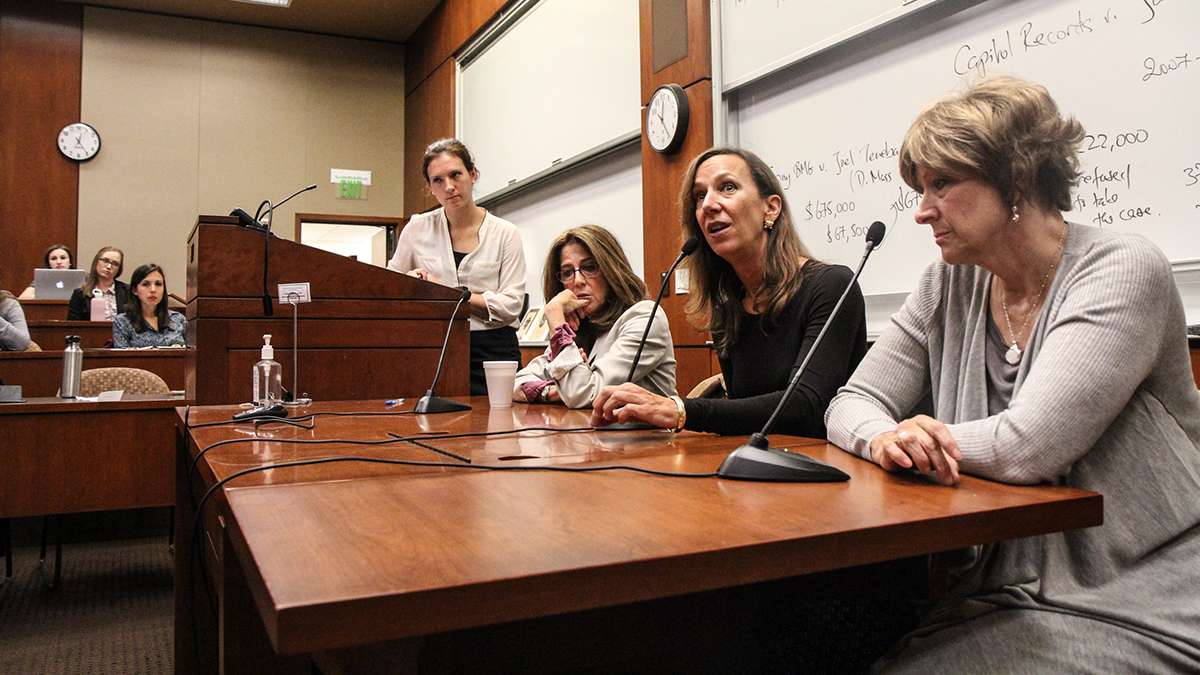Hearings for hundreds of Pa. lifers sentenced as juveniles a daunting task
Listen
Marsha Levick (third from right) the co-founder of the Juvenile Law Center sits on a panel. (Kimberly Paynter/WHYY)
Hundreds of Pennsylvania inmates serving life sentences now have a shot at release after last month’s U.S. Supreme Court ruling on juvenile lifers.
While everyone agrees that the decision should give certain prisoners new hearings, how exactly that will play out is being debated fiercely.
Pennsylvania has the dubious distinction of having more offenders serving life behind bars for crimes they committed as teens than any other state.
There are two reasons for this. First, a state law that establishes that there’s no minimum age for someone to be charged with felony murder. Secondly, a law requiring mandatory life imprisonment for anyone convicted of first- or second-degree murder.
The Supreme Court court said in 2012 that, going forward, a juvenile can’t be given mandatory life sentence without the possibly of parole. And in January, the high court said that should apply retroactively — to all the cases before 2012.
“I think everyone agrees that the United State’s Supreme Court’s decision is the law and the land and needs to be implemented. The question is not that. The question is, ‘How can it be implemented, and what exactly is required?'” said Bradley Bridge with the Defender Association of Philadelphia.
He said there are many ways to go forward, and no clear direction. Should new hearings be heard is state court, or federal court? Should one judge oversee all the cases? Should prosecutors and defenders get together and set up rules for streamlining?
“Absent that, we need to come up with 300 prosecutors, 300 judges, 300 defense attorneys, 300 expert witnesses, to be able to do that, and that will cost hundreds of millions of dollars,” Bridge said.
In the historic decision, Justice Anthony Kennedy wrote for the majority that prisoners who committed heinous acts as teenagers should be given a chance to show despite their past crimes they do not represent “irreparable corruption.”
Former prosecutor Joe McGettigan thinks some of the defendants have not yet paid their full debt to society.
“The person they killed, is long since dead, turned to dust, and they’re not getting another chance,” McGettigan said.
He said the decision doesn’t consider family members of victims who may still be grieving.
“Nor does the ruling demonstrate, as great a concern, in the interest of the state in protecting its citizens, as it does in granting juvenile murderers some consideration,” McGettigan said.
Pennsylvania’s Department of Corrections spokeswoman Susan McNaughton said juvenile lifers — some who are now in their 50s, or 60s — have had workshops about their options. And most of them have been going through rehabilitation to help them transition into society.
“We’re going to teach them about computers. We’re going to teach them about how gas pumps work, cell phones,” McNaughton said. “A lot of these people have been in prison possibly for decades and haven’t had any experience with those things.”
But it could take many more months until local and federal courts in Pennsylvania figure both agree on how to interpret the Supreme Court case, and then, shake hands on where these hearings are going to take place.
Philadelphia prosecutors and defense attorneys have exchanged many back-and-fourths figuring out how old lifers were at the date of the crime. If younger than 18, an inmate qualifies for a new hearing. But if they were older, even by days, they’re out of luck.
Prosecutor Susan Affronti with the Philadelphia District Attorney’s Office recently wrote a letter to the U.S. District Court for Eastern District of Pennsylvania asking that federal judges not immediately accept petitions for new hearings from juvenile lifers. Some issues, Affronti said, still need to be worked out, like disputes over defendants ages.
“What is clear from this cursory review is that the actual age of [the petitioners] may not be clear,” she wrote. “The ultimate impact [of the U.S. Supreme Court case] remains uncertain.”
WHYY is your source for fact-based, in-depth journalism and information. As a nonprofit organization, we rely on financial support from readers like you. Please give today.




